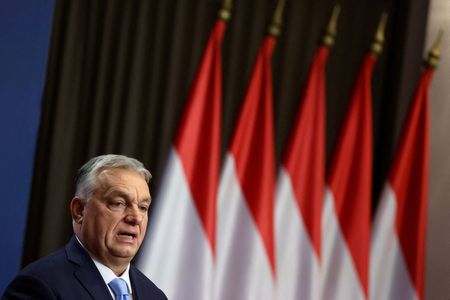By Gergely Szakacs
BUDAPEST (Reuters) – Hungarian Prime Minister Viktor Orban’s hopes that a strong economy will propel his Fidesz party to another election victory in 2026 are being challenged by a rebound in inflation, sagging household morale and even a plunge in the birth rate he so wants to boost.
Last week’s warning by the central bank of heightened inflation risks was the latest bad news for the veteran leader, whose government now faces the threat of possible U.S. tariffs hitting its export-reliant economy.
Hungary endured the worst inflationary surge in the European Union following Russia’s February 2022 invasion of Ukraine and prices remain a big concern for households.
“Hungarians have not seen such a decline in living standards since Fidesz came to power (in 2010),” said Balazs Szent-Ivanyi, a political economist at Aston University focusing on central Europe.
An EU survey conducted in January found consumers were more pessimistic about their economic prospects than a year ago, while nearly four out of ten Hungarians expect their financial situation to deteriorate, according to insurer Generali.
“The high levels of inflation in 2022 and 2023 have left their mark, with many households seeing declines in their real incomes,” Szent-Ivanyi said, adding that Orban’s party could still use its media network to shape public discourse in its favour ahead of the vote.
Orban launched a $5.35 billion spending spree ahead of the last election in 2022 to fend off a threat from a previous opposition challenger — with the vote handing him another landslide victory at the cost of fanning inflation.
None of the 12 economists surveyed in a January Reuters poll expect Hungary’s economy to reach the 3.4% growth Orban baked into this year’s budget. Erste Bank, last year’s most accurate forecaster of Hungarian economic indicators, sees growth at 2%.
The European Commission sees growth at 1.8% which, while impressive compared with the stagnation some euro zone governments are facing, would cap the weakest three-year stretch leading up to a national election during Orban’s 15-year rule.
Orban plans to raise family benefits in the second half and further still in 2026, but even with what his cabinet has described as the most generous such scheme in Europe, Hungary’s birth rate has plunged to its lowest in more than a decade.
Some polls show Peter Magyar’s surging centre-right Tisza party has overtaken Fidesz.
Capital Economics Emerging Europe analyst Nicholas Farr says that raises the “real prospect” of Orban losing an election for the first time since taking power in 2010.
BACKLASH
With the race looking tight, Orban will pull out the stops towards the end of the year to boost the economy, also using his dominance of media and public institutions to his advantage, Eurasia Group Europe Managing Director Mujtaba Rahman said.
“His communications machine is excellent for persuading his core voters things will get better,” he said.
Orban aims for an economic boost from subsidies for home purchases and renovations, increased tax benefits for families, a capital injection for small businesses as well as wage and pension increases.
Large-scale handouts helped him to an easy victory at the last election in 2022, but with the forint near two-year-lows to the euro and the deficit above EU standards, a similar spending surge now could risk a market backlash.
Credit rating agencies have warned they could downgrade Hungary if its state finances deteriorate beyond expectations.
“The big risk is the budget towards the end of the year and the desire for election giveaways, potentially leading to a weakening of the forint which will then feed through to price rises in imported goods,” Rahman said.
Orban will hope Hungarians start to feel better about their prospects as the election approaches, although his government appears to have pushed back expectations for a stronger economic rebound to the second half of this year.
A late-November survey by think tank Policy Solutions found Hungarians were mainly concerned by their salaries, which are among the lowest in the EU even though food prices have shot up to EU average levels.
“The main issue will be whether Hungarians feel like they can afford somewhat more from their income relative to the price levels which have emerged in the past years,” Policy Solutions Director Andras Biro-Nagy said.
(Reporting by Gergely Szakacs; editing by Mark John and Toby Chopra)











